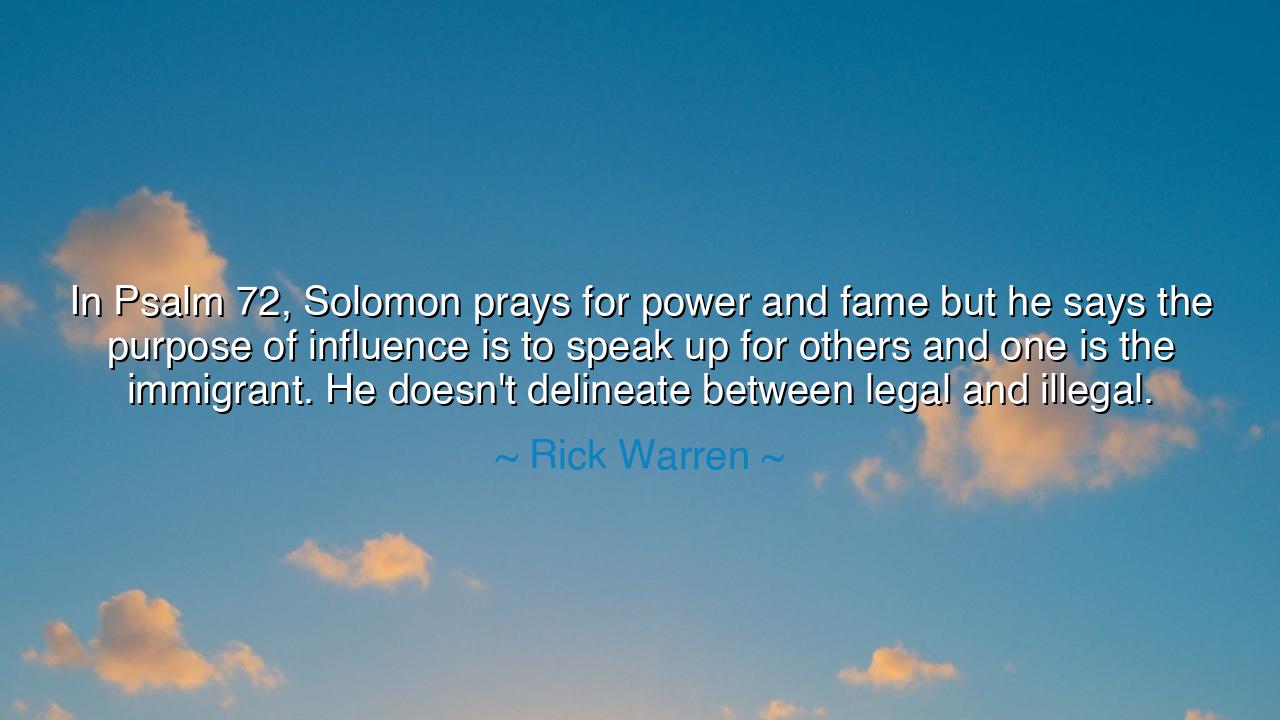
In Psalm 72, Solomon prays for power and fame but he says the
In Psalm 72, Solomon prays for power and fame but he says the purpose of influence is to speak up for others and one is the immigrant. He doesn't delineate between legal and illegal.






Hear the voice of Rick Warren, a shepherd of souls, who proclaimed with clarity: “In Psalm 72, Solomon prays for power and fame but he says the purpose of influence is to speak up for others and one is the immigrant. He doesn’t delineate between legal and illegal.” These words pierce through centuries of division and remind us of the eternal law of justice: that influence and power are not given for self-exaltation, but for the defense of the vulnerable, the voiceless, and the stranger in the land.
In Psalm 72, the great king Solomon asks not only for dominion, but for wisdom to rule justly, for power to protect the weak, and for blessing to defend the poor. His prayer is not for glory alone, but for a throne rooted in compassion. Among those he calls us to remember is the immigrant, the stranger who dwells among the people, seeking shelter, sustenance, and dignity. In this sacred text, there is no mention of categories, of legal or illegal; there is only the universal command to care for the foreigner as one would care for kin.
This truth is ancient. In the Law of Moses, the people of Israel were commanded again and again: “You shall not oppress the foreigner, for you were strangers in the land of Egypt.” Their memory of exile was to shape their justice, their own suffering to fuel compassion for the displaced. And in Solomon’s psalm, this vision endures: that kings, priests, and all people of influence must wield their power not to protect themselves alone, but to lift up the stranger, the poor, and the oppressed.
History itself confirms this sacred duty. Recall the tale of Ellis Island, when millions of immigrants came to America with nothing but hope. There were those who despised them, who called them unwanted, who sought to divide them into worthy and unworthy. Yet there were also leaders and citizens who opened doors, who defended their dignity, and who gave them a place in the story of the nation. These immigrants, once strangers, became workers, builders, and leaders, enriching the land that had once seemed foreign. In them, Solomon’s wisdom was fulfilled: the purpose of influence is to defend the outsider.
And contrast this with darker times, when nations refused to heed this command. In the years before the Holocaust, countless refugees sought safe harbor from persecution, yet many countries shut their doors. Bureaucracy, fear, and legality stood in the way of compassion. The result was catastrophe: lives that could have been saved were lost because leaders forgot that the measure of influence is mercy. Warren’s words echo as a warning: to debate legality while ignoring humanity is to miss the very heart of Scripture.
The lesson is clear: power is stewardship. Whether you are a king upon a throne, a leader in government, or a citizen in your community, your influence is not for yourself alone. It is entrusted to you so that you may defend those who cannot defend themselves. And among them, never forget the immigrant—the one who comes with trembling hands, with stories of loss, with hope that you will treat them as neighbor and not as enemy.
Therefore, in your own life, do not harden your heart with categories and labels. See first the humanity before you, not the legality behind them. Offer welcome, speak up when others are silent, and use whatever influence you possess—whether great or small—to defend the dignity of the stranger. For in doing so, you fulfill the ancient wisdom of Solomon, the command of Moses, and the teaching of every prophet who cried out for justice.
So let Rick Warren’s words be etched into your spirit: influence exists not for self, but for others; not for privilege, but for service. And among those we are called to serve, the immigrant must never be forgotten. For in welcoming the stranger, we welcome the image of God Himself, and in protecting the foreigner, we protect the very soul of our humanity.






AAdministratorAdministrator
Welcome, honored guests. Please leave a comment, we will respond soon